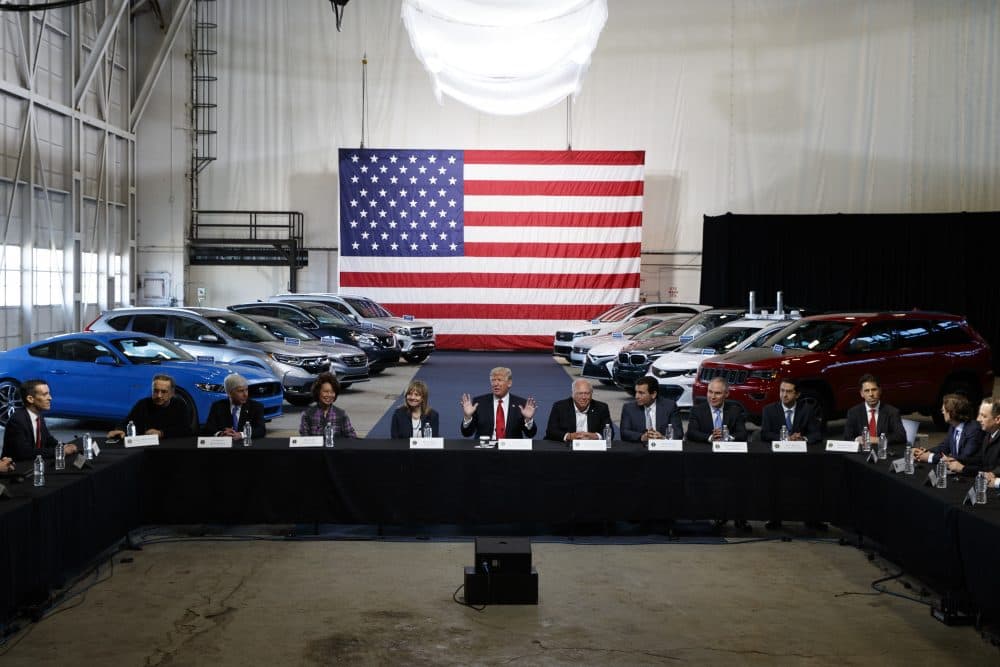Advertisement
Commentary
Not So Strong After All: Climate Change Is Trump’s National Security Weakness

For George W. Bush, 2017 has been a great year. The 43rd president left office with many historians declaring him the worst chief executive ever, largely for starting a misguided war that did little for national security. But if the Trump administration keeps up its current pace, Bush can dream of climbing a step or two out of the cellar and past the Oval Office incumbent.
With his recent executive order rolling back Obama-era climate policy, Trump is looking like a national security wuss.
Yes, the unfolding environmental problem that is climate change has security implications as well that could make it Trump’s Iraq, assuming he doesn’t blunder into a real war somewhere. Trump’s missile strike last week against Syria’s regime for its lethal sarin attack on civilians, a justified response to an atrocity, made the president look like a strong good guy — temporarily. But while Syrian President Bashar al-Assad is an existential threat to his own people, he poses no such danger to us and the world. By contrast, generals and defense experts say climate change denial threatens us all with consequences ranging from potential military downsides to worse natural disasters.
According to a 2012 Homeland Security Department report, “The risks posed or exacerbated by a changing climate — such as intensifying or more frequent extreme weather events, natural disasters, and sea ice changes in the Arctic — may either directly or indirectly affect core homeland security missions." The following year, Admiral Samuel J. Locklear III, head of the Pacific Command overseeing 400,000 troops from California to India, called climate change “the most likely thing that is going to happen … that will cripple the security environment.”
Yes, the unfolding environmental problem that is climate change has security implications as well that could make it Trump’s Iraq, assuming he doesn’t blunder into a real war somewhere.
“The ice is melting and sea is getting higher,” Locklear told The Boston Globe. “The island of Tarawa in Kiribati, they’re contemplating moving their entire population to another country because [it] is not going to exist anymore. … We have interjected into our multilateral dialogue — even with China and India — the imperative to kind of get military capabilities aligned [for] when the effect of climate change starts to impact these massive populations. If it goes bad, you could have hundreds of thousands or millions of people displaced and then security will start to crumble pretty quickly.”
Trump’s order overrides a directive from Obama that required federal agencies to collaborate with local officials on preparing for these possible effects. Obama’s order followed the devastation of Hurricane Sandy in 2013; its goal was to deal with the current regime of “extended droughts, extreme flooding, rapid sea level rise, [and] deadly heat waves,” according to Alice Hill, a National Security Council official under Obama. Talk about the Trump-Bush analogy. (Remember the Bush administration's bollixed response to Hurricane Katrina?)
Advertisement
Trump supporters doubtless consider Obama a green grouser whose mingling of defense and environmental concerns should be ignored. But myopia about soft security is a pattern with Trump, evident as well in the chainsaw he plans to take to scientific research funding. In 1964, as "Dr. Strangelove" and "Fail Safe" gave cinematic expression to Cold War fears, Uncle Sam spent on research and development double what it does today, “even in the face of threats such as terrorism, cyberattacks, climate change, and potential pandemics,” MIT President L. Rafael Reif writes.
Why would a Republican president who famously deems himself a winner gamble with security, supposedly his party’s forte? Beyond dismissing climate change as a Chinese hoax, Trump also believes environmental regulations cost jobs. His executive order is titled “Promoting Energy Independence and Economic Growth,” and among the policies it kills in the name of that growth is a ban on mining for coal on federal lands.
The evidence suggests that rather than rely on the White House, the ... market demand for clean energy will have to keep us on the environmental path, regardless of the detours Trump puts up.
Trump has vowed to revive the coal industry, but that confirms how misguided his thinking is. Coal mining jobs aren’t coming back, not because of socialistic environmentalism but rather greater automation in mining, the availability of cheaper natural gas and corporate demand for cleaner energy.
Coal pipe dreams aside, economists say environmental regulations are, at best, a puny jobs retardant. Market forces are powerful and flexible; while coal mining jobs have vanished, jobs in natural gas and renewable energy sources are surging. As David Roberts notes in Vox, many free-market types contradict themselves with their anti-environmentalism: They laud capitalism for its innovation and ingenuity, yet act as if the market economy will be forced into a fetal position by any regulation at all.
Trump’s executive order also sidelines Obama’s Clean Power Plan, which would reduce carbon emissions pouring from coal-fired power plants. It’s true that the Environmental Protection Agency must devise a replacement for Obama’s plan if it ultimately decides to repeal it. It’s also true that there’s a sound, less bureaucratic alternative available: a stiff tax on polluters, based on their emissions’ carbon content.
But does anyone believe that a president who appointed a climate change skeptic to run the EPA gives a whit about devising a robust alternative to the Clean Power Plan? The evidence suggests that rather than rely on the White House, the aforementioned market demand for clean energy will have to keep us on the environmental path, regardless of the detours Trump puts up. Former New York Mayor Michael Bloomberg argues this will be the case.
Bloomberg may well be right. Meanwhile, somewhere in Texas, George W. Bush is grinning ear to ear.
